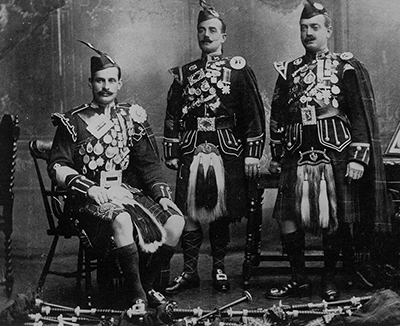
Pipe Major William Ross’s third book of ceòl beag appeared in 1938 and was reviewed anonymously in the Oban Times newspaper. The review was positive, congratulating the author and publisher on ‘a notable addition to the literature of the Highland bagpipe’.
However one paragraph set the fans and family of piper and composer GS McLennan all aquiver. It read: ‘…..but Pipe Major Ross has avoided the grosser forms of exagerration prevalent in some quarters nowadays, such as the deplorable addition of an extra high G gracenote to the little finger beat on the final A of each part..’
The review appeared on November 5 of that year. One week later George Stewart’s half brother, Donald Ross MacLennan, weighed in, dirk unsheathed: ‘The review of Pipe Major Ross’s Book of Pipe Music which appeared in your issue of November 5 will have been read with interest by many pipers, containing as it does so much wealth of detail.’
Referring to the paragraph above DR goes on: ‘My late brother GS McLennan was perhaps one of the greatest exponents of this ‘deplorable’ movement. He was, to my mind, and to many pipers’ minds, the finest player of marches, strathspeys, reels, jigs and hornpipes of his time, and no piper I have heard since has quite reached his high standard of playing.
‘There were no ‘gross forms of exagerration’ in his playing and it certainly was never deplorable. It would be interesting to know where the reviewer of this book finds the authority for such a statement.
‘The composer of the MacGregor’s Salute has given us a most piperly tune. His second second beat gives us the ‘deplorable addition of an extra high G gracenote to the little finger beat’, which he also uses with great charm ‘on the final ‘A’ of each part’ of the ground etc., and so far as I am aware no one has ever questioned his good taste.
‘Personally, I fail to see why, in playing a march like Glengarry Gathering one may presumably play a G gracenote on the little finger beat in the first bar of the tune but may not play a G gracenote on the little finger in the self same movement in the last bar of any other tune.
‘I have been told that the reason the G gracenote should be omitted is that there is already an E gracenote to the low A. In that case why do we play the third part of Blair Drummond with the ‘deplorable addition’?
‘To all of us the leaving out of the G gracenote in Blair Drummond would certainly be a deplorable omission, and to me that omission at the end of a march takes away the whole beauty of the embellishment. Pipers may try both movements in company and form their own opinion as to which is the better.
‘Prevalent in some quarters nowadays‘ tends to give the impression that the movement with the high G gracenote is something new and something entirely wrong. It is neither new nor wrong as a careful study of some of the old books will show.
‘The opening line of the review states: ‘A new book by such a master as P/M Ross etc…’ I feel sure that P/M Ross himself would be the first proudly to own GS McLennan as a brother master, but I feel that had I failed to comment on this review I would have been an unworthy brother of such an illustrious piper, and a poor son indeed of my late father.’
‘I am etc… DR MacLennan, Pipe Major.’
- To be continued.